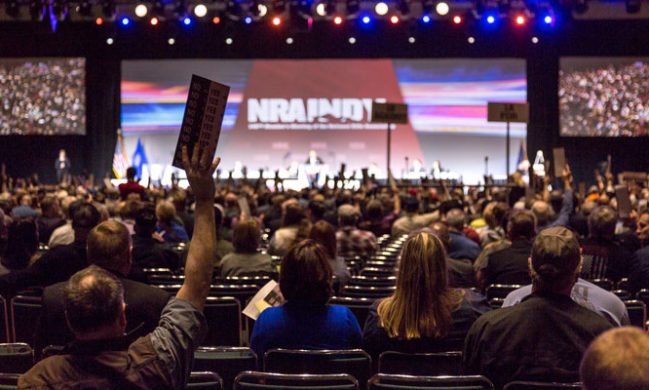Smells Like Infringement
Anti-Gun Playbook: All Boyfriends Are Abusers Now
This is, hands-down, one of the anti-gunners’ neatest tricks.
Amid all the furor about “red flag” laws, something has been lost: For decades now, it has been very simple to have someone’s gun rights revoked for life even if their crime was a misdemeanor, and even if that crime doesn’t rise to the level of what most Americans consider violence. It’s tough to discuss publicly, because the argument is spring-loaded with a powerful public stigma: Domestic violence. Nobody wants violent abusers to have access to guns, but there’s a little problem of late: The definitions of “domestic,” “violence,” and “abuse” have been evolving even faster than the definition of “woman.” NRA-ILA, which is the lobbying arm of the NRA, calls it “the boyfriend loophole.” Of course, the anti-gunners are just wild to widen that loophole to an interstate. Here are the hard facts, sifted out from all the emotion:
_______________________________________________________
The So-called “Boyfriend Loophole” is About Undermining the Second Amendment
At present, federal law generally bars anyone who is convicted in any court for a domestic violence felony, or any felony for that matter, from possessing firearms. But federal law also imposes a lifetime firearm possession prohibition on those who have been convicted in any court of a “misdemeanor crime of domestic violence” (MCDV). Under the federal statute, in order for a misdemeanor conviction to trigger the firearm ban, the conduct must have been both “violent” and “domestic.”
First, to meet the “violence” prong, the crime must have “as an element, the use or attempted use of physical force, or the threatened use of a deadly weapon.” This may seem straightforward, but the U.S. Supreme Court has effectively read the “violence” component out of the definition of MCDV.
In U.S. v. Castleman (2014), the U.S. Supreme Court determined that a person’s use of physical force need NOT be violent in order to trigger the firearm prohibition. Rather, such physical contact may consist of only the slightest “offensive touching” necessary for common law battery. In fact, under the common law battery standard, merely touching a person’s clothing, bag, or something they are holding in their hand in a completely non-violent manner could give rise to a lifetime firearm prohibition.
Second, to meet the “domestic” component, the crime must have been “committed by a current or former spouse, parent, or guardian of the victim, by a person with whom the victim shares a child in common, by a person who is cohabiting with or has cohabited with the victim as a spouse, parent, or guardian, or by a person similarly situated to a spouse, parent, or guardian of the victim.” These are categories that are readily understood.
This current lifetime firearm prohibition for a MCDV treats the Second Amendment as a second-class right. No other fundamental, enumerated Constitutional right is permanently lost for a misdemeanor conviction. There is good reason that rights are not extinguished for a lifetime based on misdemeanor convictions. In addition to the law viewing misdemeanor conduct less harshly than felony conduct, misdemeanor defendants are not always provided with the same level of exhaustive due process as those charged with felonies.
Proponents of the original MCDV firearm prohibition contended that the supposed unique nature of “domestic violence” required a firearm prohibition for those convicted of misdemeanors. They claimed domestic crimes that should have been felonies were often reduced to misdemeanors because abused spouses and children were reluctant to cooperate with prosecutors due to financial and emotional dependence on the abuser or a shared responsibility for raising children. Therefore, it was argued, the only way to keep firearms away from these should-be violent felons was to prohibit those convicted of a MCDV from possessing guns.
Here is where the so-called “boyfriend loophole” comes in.
Having done away with the “violence” requirement of the MCDV prohibitor through the courts, gun control activists now want to eliminate the “domestic” component by expanding the categories of relations that give rise to a prohibiting “domestic violence” conviction to include a “dating relationship.”
Under the current federal prohibition, “boyfriends” and other intimates are already covered if the relationship has an actual “domestic” component (children in common, cohabitation, etc.). Therefore, the proposed prohibition expansion to “dating partners” targets relationships without this “domestic” component and lacks the justifications involving emotional and financial attachment or interdependence that gave rise to the original MCDV prohibition.
Given the complexity of human relationships, the fluidity of modern dating culture, and Congress’s express attempt to go beyond an actual “domestic” context, it is reasonable to ask: What constitutes a “dating relationship?” Good luck trying to find out.
No matter what Congress might put in statute, it will be up to anti-gun Attorney General Merrick Garland and the federal courts to flesh out the details. And Americans can be certain that the gun control lobby will be there every step of the way to ensure the definition is interpreted as broad as possible.
Imagine how the elimination of the “domestic” component of MCDV definition would interplay with the elimination of the “violence” component that has already taken place. Extending MCDV prohibition offenses to “dating partners,” a broad, vague term that involves none of the interdependence that purportedly justified the original prohibition, is a clear example gun control opponents’ attempts to vastly expand the list of Americans prohibited from possessing firearms.
The idea that there are “loopholes” for domestic violence perpetrators are false. The legal and criminal justice systems have the necessary tools to prohibit dangerous individuals from possessing firearms – including prosecuting felonious level conduct as a felony.
Domestic violence crimes can and should be taken seriously under the law. The NRA supports that, just as we support empowering the abused to defend themselves and their families. We what do not support is exploiting real problems, like domestic violence, to opportunistically target civil rights, like the Second Amendment and constitutional due process.
__________________________________________________________________________
NRA-ILA is financially separate from NRA’s corporate entity, and is the part of the NRA that does all of the lobbying on Capitol Hill. You can support them without buying Wayne LaPierre a new wardrobe by clicking here.
-

 Breaking News4 days ago
Breaking News4 days agoNaked: Kirk Slaying Exposes Left’s Lust for Violence
-

 Sh*t Anti-Gunners Say2 months ago
Sh*t Anti-Gunners Say2 months agoGreat Big Gobs of Greasy, Grimy Gavin Scum! Newsom Now Says He Respects the 2A
-

 Breaking News4 days ago
Breaking News4 days agoCharlie Kirk Assassinated: Details, Reactions & Manhunt (Photo Released)
-

 Gun Rights2 months ago
Gun Rights2 months agoFind Someone Who Loves You As Much As Democrats Love Mass Shootings
-

 Breaking News2 weeks ago
Breaking News2 weeks agoSecond Amendment Wins: Top Gun Rights Victories This Week
-

 Breaking News4 weeks ago
Breaking News4 weeks agoBrooklyn Shooting: Gun Control Fails, 2A Needed!
-
2A Living6 days ago
Freedom Retreat 2025: Top 10 Steps to Build






